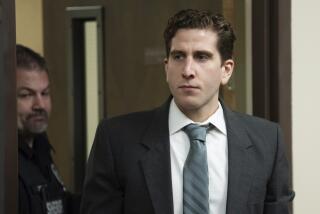Terrorist Suspect Wants Trial on TV
- Share via
ALEXANDRIA, Va. — Lawyers for the only man charged in connection with the Sept. 11 terrorist attacks urged a federal judge Friday to televise his trial, saying it would provide “an additional layer” of fairness to the proceeding.
Zacarias Moussaoui’s team of public defenders filed the motion in support of an application by Court TV, which is seeking to broadcast the trial, set to begin in October.
The Justice Department said Friday it opposed Court TV’s motion, contending it is neither constitutionally required nor a good idea.
Moussaoui faces six felony charges, including conspiring with Osama bin Laden, the 19 hijackers and others to murder thousands of people in the attacks on the World Trade Center and the Pentagon. If convicted, the 33-year-old French citizen of Moroccan descent could face the death penalty.
“Mr. Moussaoui recognizes that the American criminal justice system will be on display for the entire world as the trial of this action proceeds,” said Edward MacMahon, one of Moussaoui’s court-appointed attorneys, in a legal memorandum.
Moussaoui, however, opposes Court TV’s efforts to have pretrial proceedings televised, saying that airing such procedures could taint the prospective jury pool, according to the motion.
“We believe that picking a jury in this case will be an extremely difficult if not impossible process,” the request said.
One legal expert said the motions by Court TV, Moussaoui and the Justice Department present U.S. District Judge Leonie Brinkema with compelling reasons both for and against allowing the trial to be televised.
For decades, terrorists have sought a public forum in which to air their views, and, given the events of Sept. 11, the Moussaoui trial is expected to be the most closely followed terrorism trial in American history, said Khaled Abou El Fadl, a professor at UCLA law school who specializes in Islamic law and terrorism.
Defendant Refused to Enter a Plea
Already, Moussaoui, an admitted Islamic militant, has invoked the name of God in refusing to enter a plea to the charges against him at his arraignment earlier this week. Brinkema entered a not-guilty plea for him.
But the fact that the Moussaoui trial will be so closely watched and highly politicized is precisely why it should be televised, Abou El Fadl said.
“The saving grace of every independent legal system in the history of democracy has been public openness and accessibility; the concept that whatever the government does, it must do before everyone’s eyes,” Abou El Fadl said. “It puts the government, and even judges, on their best behavior when they know they are being observed.”
Abou El Fadl said prosecutors, judges and even juries “tend to become far more reserved” when they know that there is a public audience following their every move. And while reports of the trial by print and television reporters also provide the public with such an accounting, “it doesn’t afford the same level of security and protection of the integrity of the system as televising a trial does,” Abou El Fadl said. “It is crucial in these types of procedures that we present an image of complete fairness so there are no feelings of conspiratorial attitudes” on the part of the judge, prosecutors and jury.
Brinkema has set a hearing for Wednesday to take up Court TV’s motion and related issues.
Lawyers for Moussaoui had no comment Friday.
The government has alleged that Moussaoui participated actively in the terrorist conspiracy and may have been trying to become a hijacker on one of the planes. Moussaoui was detained in Minnesota in August on immigration violations, however, and was in custody Sept. 11.
Justice Department Outlines Opposition
In arguing that Court TV’s motion should be denied, the Justice Department said televising federal criminal proceedings is prohibited by federal rules of criminal procedure and for other reasons.
“Although a weighing of the various arguments for and against televising these proceedings is not appropriate [in the motion], there are in fact compelling reasons why these proceedings should not be televised,” according to the Justice Department’s court filing.
Brinkema’s decision to start the trial in October was made over defense attorneys’ objections that they will not have enough time to prepare. They also said the date is too close to the first anniversary of the attacks in New York and at the Pentagon, which is less than two miles from the courthouse.
Brinkema also gave prosecutors until March 29 to say whether they intend to seek the death penalty.
Court TV, a cable television network that broadcasts legal proceedings and is owned by AOL Time Warner Inc. and Liberty Media Co., argued in its motion that all 50 states allow some type of television coverage in their courtrooms and that 37 states allow cameras in criminal proceedings.
The network also said the ban on televising federal criminal trials is unconstitutional on grounds that 1st Amendment protections give the public the right to have access to courtroom proceedings.
More to Read
Sign up for Essential California
The most important California stories and recommendations in your inbox every morning.
You may occasionally receive promotional content from the Los Angeles Times.













